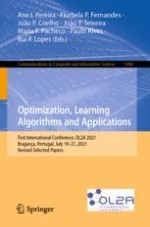2021 | OriginalPaper | Buchkapitel
Model-Agnostic Multi-objective Approach for the Evolutionary Discovery of Mathematical Models
verfasst von : Alexander Hvatov, Mikhail Maslyaev, Iana S. Polonskaya, Mikhail Sarafanov, Mark Merezhnikov, Nikolay O. Nikitin
Erschienen in: Optimization, Learning Algorithms and Applications
Aktivieren Sie unsere intelligente Suche, um passende Fachinhalte oder Patente zu finden.
Wählen Sie Textabschnitte aus um mit Künstlicher Intelligenz passenden Patente zu finden. powered by
Markieren Sie Textabschnitte, um KI-gestützt weitere passende Inhalte zu finden. powered by
